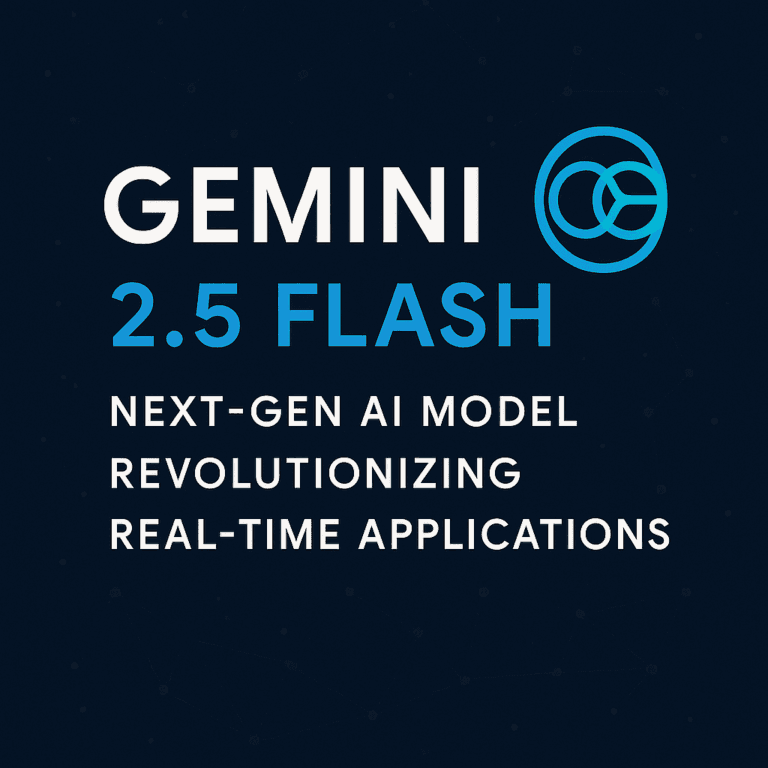Introduction
At the forefront of artificial intelligence advancements, Google has unveiled Gemini 2.5 Flash, a groundbreaking model designed to deliver rapid, cost-effective, and intelligent responses. This development marks a significant leap in AI capabilities, emphasizing speed without compromising on reasoning and accuracy.
What is Gemini 2.5 Flash?
Gemini 2.5 Flash is part of Google’s Gemini 2.5 series, optimized for high-speed performance and efficiency. It’s tailored for applications requiring swift responses, making it ideal for real-time interactions and large-scale deployments. Despite its emphasis on speed, it doesn’t sacrifice the depth of understanding, thanks to its innovative “thinking budget” feature.
Key Features
Hybrid Reasoning Model: Gemini 2.5 Flash introduces a “thinking budget,” allowing developers to control the depth of reasoning the model applies to tasks. This flexibility ensures a balance between response time and computational resources.
Multimodal Input Support: The model can process various input types, including text, code, images, audio, and video, enhancing its versatility across different applications.
Large Context Window: With a context window of up to 1 million tokens, Gemini 2.5 Flash can handle extensive inputs, making it suitable for complex tasks requiring substantial context.
Cost-Efficiency: Designed with affordability in mind, it offers a lower cost per million tokens, making advanced AI accessible for a broader range of applications.
Applications in Real-World Scenarios
Gemini 2.5 Flash’s capabilities make it ideal for various real-world applications:
Customer Support: Providing instant, accurate responses to customer inquiries.
Educational Tools: Enhancing e-learning platforms with real-time assistance and content generation.
Content Creation: Assisting in generating articles, summaries, and multimedia content swiftly.
Data Analysis: Processing and interpreting large datasets efficiently for business intelligence.
Gemini 2.5 Flash vs. Gemini 2.5 Pro
While both models are part of the Gemini 2.5 series, they cater to different needs:
Gemini 2.5 Flash: Prioritizes speed and efficiency, suitable for applications requiring rapid responses.
Gemini 2.5 Pro: Focuses on complex reasoning and in-depth analysis, ideal for tasks demanding higher cognitive processing.

🚀 Project Astra: Google’s Vision for the Future of AI Assistants
Introduction
In the ever-evolving landscape of artificial intelligence, Google has unveiled a transformative initiative: Project Astra. Introduced at Google I/O 2025, Astra represents a significant leap towards creating a universal AI assistant capable of understanding and interacting with the world in real-time. The Verge+5DesignRush+5Tom’s Guide+5
What is Project Astra?
Project Astra is an experimental prototype developed by Google DeepMind, designed to serve as a blueprint for future AI assistants. Unlike traditional assistants that rely solely on reactive interactions, Astra exhibits proactive behavior, autonomously observing user activity and intervening when beneficial. Google DeepMind+2The Verge+2Reddit+2
Key Features of Project Astra
Multimodal Capabilities: Astra can process and understand various forms of data, including text, speech, images, and videos, enabling more natural and intuitive interactions. Sify
Proactive Assistance: The assistant can autonomously perform tasks such as correcting homework errors or reminding users about schedules without explicit prompts. The Verge
Integration with Google Services: Astra accesses various Google services like calendars and emails to provide context-aware assistance. blog.google+6The Verge+6Reddit+6
Real-Time Video Analysis: Demonstrated capabilities include recognizing devices and executing settings changes without user input, showcasing early-stage proficiency in operating Android devices independently. The Verge
Implications for the Future
Google envisions Astra as the model for future assistants that will require fewer prompts, offering seamless, intelligent support across devices. This ambitious goal seeks to redefine user interaction with technology, making AI an indispensable part of daily life. The Verge
Galaxy Institute’s Perspective
At Galaxy Institute, we are committed to staying at the forefront of technological advancements. The introduction of Project Astra underscores the importance of AI literacy and the need for educational institutions to adapt to these rapid changes. We aim to integrate such emerging technologies into our curriculum, preparing our students to be innovators in the AI-driven future.
Conclusion
Project Astra represents a significant stride in AI development, moving towards assistants that are not only reactive but also proactive and context-aware. As we embrace this new era, Galaxy Institute remains dedicated to equipping our students with the knowledge and skills necessary to thrive in a world increasingly shaped by artificial intelligence.

